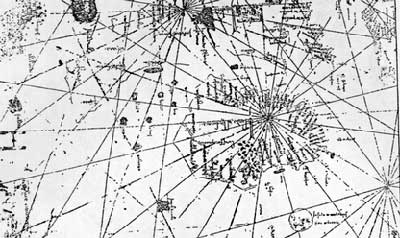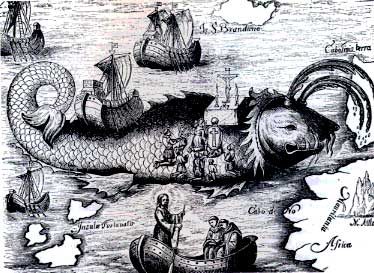|
The name Brazil is probably the sweetest
sounding name that any large race of the Earth possesses. How
this musical name came to be assigned to the great country of
South America did not interest me until after I had landed at
Santos [4] in the autumn of 1906. We accept the names of
countries and of places as we find them on maps without
question taking them as a matter of course just as we accept
the Atlantic Ocean or Asia. The name seems a part of the
country and if a very inquisitive mind should ask the origin
of the name itself, reference is made to a school geography,
where the new-comer may find a probable commonplace origin.
Thus it is with the name Brazil.
|

Map by Dalorto (1325), including
Hy-Brassil and Daculi islands |
The beautiful name that we are told came from a
dye-wood used in the commerce of the middle ages. Whether it
be the individual Brazilian we ask, the school book we turn to
or the encyclopaedia we appeal to, the answer is the same -
brief, unexplanatory and precise - the country was named from
the abundance of the dye-wood that was soon exported from its
shores after the discovery. It was first called Terra de
Santa
Cruz
- Land of the Holy Cross - by Cabral,
[5] its discoverer, a
baptism that the King of Portugal his master confirmed. But in
spite of official and royal recognition the dye-wood prevailed
over the wood of the true cross. Such, in brief, is the
universal reason assigned to the naming of Brazil. No writer
has even got beyond this: altho' a few have been on the
threshold of the truth without knowing it. For there is no
doubt at all that in so deriving the name Brazil the country
from the dye-wood of medieval commerce, the school book, the
individual Brazilian, the encyclopaedia and the dictionary are
astray.
They have been satisfied from the first with a
half truth only, and not seeking further, or not knowing where
to seek they have stopped short with a reason that not only
gives no meaning, but leads the mind astray.
One or two of the writers who have dealt with
the origin of the name have been quite in sight of the truth,
but the limitations of European learning which had been shut
off for centuries from the one literature that could have made
things more clear.
Strange as it may seem, Brazil owes her name
not to her abundance of a certain dye-wood but to Ireland. The
distinction of naming the great South American country, I
believe, belongs as surely to Ireland and to an ancient Irish
belief old as the Celtic mind itself.
It may be asked how it is that none of the
standard works upon the discovery of the two Americas contain
an inkling of the truth. How comes it that authors, who are
claimed as classics, have all failed to trace the origin of a
name that covers one of the greatest dominions of the two
continents to whose history and professional development they
have devoted the genius of their pens and the erudition of
great minds.
The answer can only be that the name of those
who have undertaken the task have realised that Ireland played
a more important part in the life of medieval Europe than
later day records assign her, and that her influence on the
minds of men was not confined to religious questions, but
extended very largely into the commercial and intellectual
life of the times. Far from being a remote "island beyond an
island" she had fleets on many seas and her speech and
shipping penetrated the western and southern seaboard of
Europe from Antwerp to Genoa. Her mariners were in every port
and while her traders had collected at Lisbon and along the
coasts of Spain in numerous and important communities her own
ports were for centuries the rendez-vous of Spanish, French
and Italian shipping, as in earlier days they had been of
Roman.
Some of the evidence on their head has lately
been given an abiding place in literature by Mrs J.R. Green
[6] in her Ireland from 1200-1600. A writer to whom Mrs Green
has accorded her grateful recognition, Mr J.R. Kenny, has also
in a series of articles, which have appeared in the columns of
the Irish press, given us a glimpse of the vast field of
international activity - whereon Ireland played so large a
part. None of these things were known to the modern authors
Washington Irving, [7] or Prescott,
[8] or Robertson,
[9] or Southey,
[10] who have dealt with American discoveries for the
English-speaking world. To them Ireland was a name that
denoted a land steeped in poverty and ignorance - the back
woods of Europe, a reproach to England it might be, but a
people having nothing to offer the scholar. Her only language
was unwritten, untaught, unknown beyond the confines of the
cabins where a race of senior barbarians lived in squalid
misery without parallel in civilization, and of such repute
that the great world of thought and culture might deplore.
With a vicarious sympathy it dismissed from serious
consideration the people and the country where such a
condition was known to prevail.
When these scholars came across some reference
to Ireland in their researches through Peninsular records
their minds were blank by reason of prevailing prejudice, the
child of ignorance, their very knowledge of their Ireland of
their own day but broadened already a wide range of
misunderstanding. What could Ireland possibly offer the
scholars who sought the beginning of European thought in its
western striving quest for a New World? Clearly nothing. It is
thus that we find so delighted an author as Washington Irving
confronted by the record which, had he known it, would have
unlocked much to his imagination, passing over with
contemptuous misreading the story of St Brendan.
[11] So
ignorant indeed was he of the origin of the story, while
admitting that Columbus
[12] must have been acquainted with it
that he speaks of St Brendan as "a Scottish monk" with no
perception of the meaning that attached to the word "Scot" or
"Scotia" in the early middle ages. In this he doubtless sinned
unwittingly not as Hallam
[13] who, with that true quality of
British meekness which seeks to inherit the Earth, writes of
Duns Scotus [14] as an Englishman.
The Hallams indeed we have always with us.
It is sufficient for an Irishman to be
distinguished in any walk of life for him to be at once
annexed.
When Washington Irving wrote his history of
Columbus the Anglo-Saxon theory of mankind was being invented.
Its cult has widened from a variety of motives; its rise
synchronised with a far less laudable minor cult which today
finds frequent expression in American historical records. I
refer to the term "Scotch-Irish" to designate the pioneers
who, in the early days of Indian border fighting, or later
revolutionary strife, did so much to build up the fabric of
America. I am not sure if Washington Irving may not be held
largely responsible for the term Scotch-Irish. In his later
literary development of the "Scotch-Irish" ancestor of the
innumerable Murphys, Sullivans, MacDonalds or O'Tooles, he
assigns their ancestry to a hybrid whom neither Ireland nor
Scotland claims. Certain it is that his Scotch monks allusion
to St Brendan has been amplified by American ignorance until
in a work published in 1892 to commemorate as "an absolutely
complete Colombian memorial (1492-1892)" the 400th anniversary
of the discovery of America; we find the Bishop of Clonfert,
born and bred in Kerry taking his place among the legendary
Scotch-Irish of the revolution.
I refer to a monumental work issued by the
Syndicate Publishing Co of Philadelphia entitled The
Discovery and Conquest of the New World, which among other
gifts to the American people, offers them in Chapter II "the
fable of St Brendan, a Scotch-Irish priest who was accredited
with first having discovered America in the sixth century". On
turning to the body of the work dealing with the episode it
becomes clear that the compilers of the modern work have
merely copied from Washington Irving's pages the scanty
references wherein he dismisses the Brendan legend. This
modern American work was offered to the American people with
an "Introduction by the Hon. Murat Halstead. Most Renowned
Journalist and Colombian student of Both Americas" and in this
gentleman's introduction we are told that to "properly
introduce to the multitudinous readers of this book the
subjects, authors and illustrations seemed a task of such
gigantic proportions as to create a feeling of awe in the
breast of the most intrepid." |



